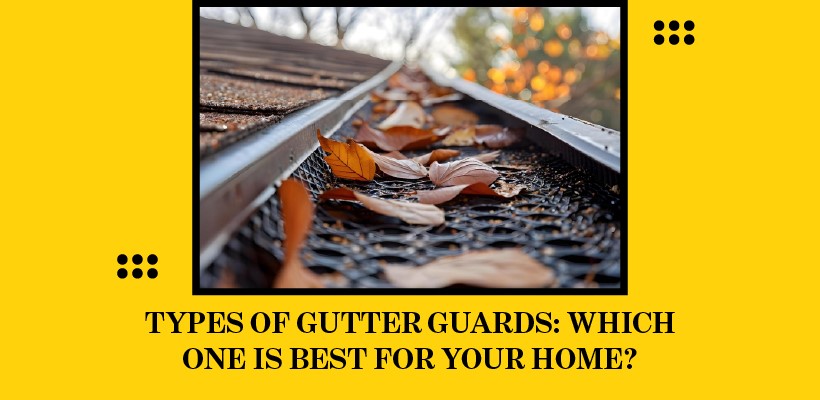Nobody likes gutter cleaning. It’s messy, time-consuming, and when not performed correctly, can lead to severe water damage. That’s where gutter guards play their role. These handy devices help prevent leaves, twigs, and other debris from clogging your gutters, saving you time, effort, and potential repair costs. But do all types of gutter guards work similarly? Obviously, not!
That’s why we have brought you this guide, which provides a detailed explanation of different gutter guard types, so you can decide which might work best for your home.
Different Gutter Guard Types
1. Screen Gutter Guards
As the name suggests, screen gutter guards feature metal or plastic screens placed over your gutters to block large debris while allowing rainwater to flow through. The various advantages of screen gutter guards include cost-effectiveness, easy installation, and more.
Let’s find out more about this gutter guard type:
Pros:
- Inexpensive and widely available
- Easy to install, often as a DIY project
- Suitable for areas with large leaves
Cons:
- Not effective against smaller debris like pine needles or shingle grit
- Require regular cleaning to remove accumulated debris on top of the screen
- Can be dislodged in high winds or storms
2. Micro-Mesh Gutter Guards
If you’re searching for the best gutter guards for metal roofs, micro mesh gutter guards are the name you can count on!
It utilizes a fine stainless steel or aluminium mesh to filter out even the smallest debris, including pollen and granules from shingles. Although it has excellent filtration properties, it may cost more than screen guards.
Pros:
- Excellent filtration
- Long-lasting and durable
- Minimal maintenance required
Cons:
- More expensive than screen guards
- Professional installation is usually recommended
- Can clog if not installed with the proper pitch or if roof oils collect on them
3. Reverse Curve (Surface Tension) Gutter Guards
These are practically the most effective gutter guards that utilize the principle of surface tension. They are designed in such a manner that the water falls over a curved edge and into the gutter while debris slides off the edge and falls to the ground.
Pros:
- Highly effective at keeping debris out
- Long lifespan
- Often come with warranties
Cons:
- Higher upfront cost
- Visibly more prominent and may alter roofline aesthetics
- Water runoff may overshoot the gutter in heavy rain if it is not installed correctly
4. Foam Gutter Guards
When discussing the easiest-to-install gutter guards, foam gutter guards tick all the boxes. Foam inserts sit directly inside the gutter and block debris while letting water seep through the foam.
Pros:
- Simple to install
- Very affordable
- Lightweight
Cons:
- Can trap seeds and promote plant growth
- Degrades over time due to UV exposure
- Needs frequent replacement
Bottom Line
Now that you are familiar with the various types of gutter guards, it is essential to consult a professional gutter guard installation company that can provide you with peace of mind by properly installing guards on top of your gutters.
Sunshine Gutters Gold is a widely trusted gutter company that provides high-quality and professional gutter guard installation in Marsyville. In addition to reliable gutter guard installation, we also provide gutter cleaning, gutter repair, gutter covering, and gutter installation services. Visit our website to know more!
FAQs about Gutter Guards
Do gutter guards eliminate the need to clean gutters?
While gutter guards might not eliminate the need for gutter cleaning, they can reduce its frequency. With gutter guards in place, you are likely to be less stressed about your rain gutters.
How long do gutter guards last?
The longevity of gutter guards depends on the type and material they’re made up of. While Micro-mesh and reverse curve guards have a longer lifespan, lasting up to 15–20 years, foam and brush guards typically require replacement every 1–3 years.
Can I install gutter guards myself?
As the installation of gutter guards requires you to climb a ladder, it is recommended that you hire a professional for the job. If you still opt for DIY gutter guard installation, choose a screen, brush, or foam guard, as they’re comparatively more straightforward to install than other types of gutter guards.
Disclaimer: The information provided in this content is just for educational purposes and is written by a professional writer. Consult us to know more about our gutter services.

